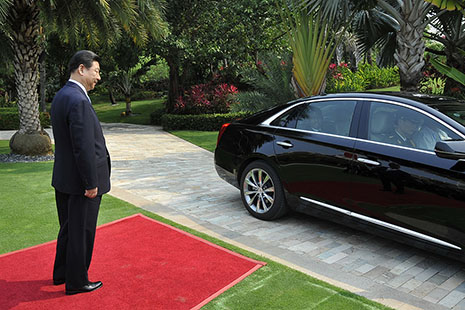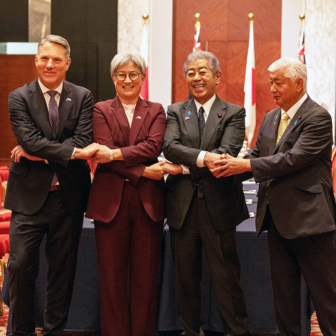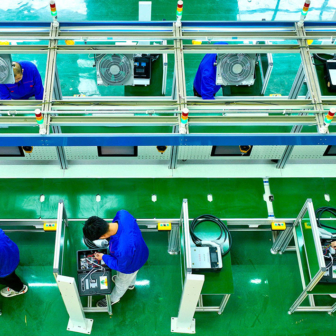On the night of 14 November 2011, Neil Heywood – a British businessman and consultant, resident in China for over a decade – was staying in the Lucky Holiday Hotel, a fading three-star residence in the suburbs of Chongqing, a province-ranked city in southwestern China. He was there, according to documents released by Chinese authorities later in 2012, at the behest of Gu Kailai (sometimes called Bogu Kailai), wife of the most powerful man in the city, Communist Party Secretary Bo Xilai. Heywood reportedly had an association with the Bo family going back to when he was resident of Dalian in northeast China years earlier.
According to the official Chinese news agency, Xinhua, which reported at the trial of Gu Kailai nine months later, some time on the evening of 14 November Gu poisoned Heywood. During the trial, Xinhua reported, Gu testified that “Heywood had threatened the personal safety of her son” and so she had decided to kill him. “To me,” she was reported to have said, “that was more than a threat. It was real action that was taking place. I must fight with my death to stop the craziness of Neil Heywood.”
Xinhua’s report continued with the direct testimony of a member of Gu’s security detail, Zhang Xiaojun:
On November 12, 2012, Bogu Kailai asked me to contact Neil Heywood, saying that she wants to meet him and I shall pick him up and bring him to Chongqing. She instructed me repeatedly that I should accompany Heywood to Chongqing. I called Heywood and he… replied that he also wished to see her, but had to check his schedule. Within half an hour, Heywood called me back, telling me he would be available the next day and asking me to book a flight for him.
Zhang stated that at 9 pm in the evening of the next day, after Heywood had taken the two-hour flight from Beijing to Chongqing, Bogu Kailai went to the Lucky Holiday Hotel with drinks, which she took to Heywood’s room. Zhang waited outside until Kailai summoned him a little later that evening, commanding him to bring prepared cyanide in a glass container. This she administered to the British man, who was by that time so drunk he was vomiting copiously. She then “told hotel waiters to leave the guest alone in Room No 1605, after hanging the ‘Do Not Disturb’ sign on the door when she left, according to testimony of a hotel waiter.” There Heywood’s body lay until hotel personnel finally forced the door down and found him, spread on the bed, two days later.
Gu’s trial raised a series of questions, some of them relating to the murder and others to the very function and exercise of power in contemporary China. Heywood’s tragic fate, the circumstances of Gu’s involvement and the trial itself mattered because of their link to the political hopes of one of the most ambitious and talented Chinese politicians of his generation, Bo Xilai. The simple fact was that the trial occurred at a moment in Bo’s life when he had the chance to reach the summit of power, the Standing Committee of the Politburo of the Communist Party of China. His wife’s activities were the first in a series of events that left Bo disgraced, facing charges of corruption, his party membership revoked and his political hopes ended.
The Heywood case aroused its greatest interest after Bo Xilai’s chief security assistant, and one of his faithful allies, Wang Lijun, fled to the US consulate in Chendu on the night of 6 February 2012. He stayed there for only twenty-four hours before personnel from the central Ministry of State Security in Beijing came to pick him up. While details of what Wang told his American interlocutors have never been released, a clear link with the Heywood case and the involvement of Gu Kailai and Bo was made. According to some accounts, when Wang was in charge of public security as one of Bo’s deputy mayors in late 2011 he was entrusted with establishing the reason for Heywood’s death. It soon became clear that Bo Xilai’s wife was involved. The final encounter between the two ended in Bo slapping Wang’s face and banishing him from his sight.
Questions swirled around Heywood’s death, and the links he and others had had with the Bo family. Conspiracy theories proliferated, ranging from the bizarre claim that a covert American campaign was working to destabilise China while it was undergoing a leadership change, to more grounded speculation that Gu’s misdemeanour, whatever its real motives, had been exploited to the full by Bo’s many enemies.
That Bo had accrued enemies during his political career was clear. His father, Bo Yibo, one of the so-called Eight Immortals, was politically active from the earliest days of the Communist Party right up to the early years of the twenty-first century; as a result, Bo belonged to the elite of the elites. Chosen over his brother at a time when Party elders were only allowed to nominate one of their offspring to a position of influence and power in the Party, Bo rose through provincial and national positions to sit on the full Politburo. By this time, he was seen as among the most likely figures for promotion at the 2012 Party Congress.
After he was made party head in Chongqing, Bo’s eye-catching campaigns to strike down the mafia, resurrect the atmosphere and some of the style of the late Maoist period, and promote low-income housing and social welfare programs captured the imagination and attention of commentators within and outside China. Most members of the Politburo, with the notable exceptions of Hu Jintao (president 2003–13) and Wen Jiabao (premier 2003–13), visited Chongqing during his period there, with figures like the then head of the powerful organisation department, Li Yuanchao, warmly lauding Bo’s reforms. According to one senior politician I spoke to in Europe in late 2011, “Bo Xilai is the only politician in China now who we can say really tries to reach out to capture the emotions of the people in ways that Western politicians aspire to. He is the one we feel as European leaders we can relate to.”
Bo’s fall revealed a great deal about elite Chinese politics, and indeed about the distribution of power generally in contemporary China. It was perhaps the most significant in a series of events during the leadership transition that began in 2011 and extended into 2013 – the first leadership change to take place without the influence of a central strongman like former paramount leader Deng Xiaoping.
This new elite – those who finally emerged at about noon on 15 November 2012 in the Great Hall of the People – is the first building block in a system of interlinked patronage, tribal, factional and institutional links that reaches out from Beijing into the five-level governmental structure of China, through the eighty-four million members of the CPC itself, and into Chinese society as a whole. The seven members of the new Politburo Standing Committee are the final clue to how power is evolving, developing and renegotiating its parameters in modern China.
While this transition was successful in producing a new line-up of leaders – first nationally, and then down to the provinces – its long-term legitimacy is an open question. At the heart of the question is the nature of the Chinese Communist Party itself. Although it came to power as a revolutionary force, the Party lives uncomfortably with its violent past. In the last decade, Yang Jisheng and other excellent Chinese historians have been asking tough questions about the ways in which the Party has exercised power in the six decades since its victory in 1949. Yang’s monumental book Tombstone calculates the enormous death toll during the great famines in the early 1960s, and imputes blame to the officials who blindly implemented destructive policies and were wilfully dismissive of their human costs.
Work on the next phase of the Party’s history, the Cultural Revolution, has become almost taboo in China over the past two decades, as figures who cut their first political teeth during this period, among them Bo Xilai, have come to occupy positions of increasing power. One of the intriguing aspects of the new generation of leaders in China is their links to that period of zealous and divisive activism and intense politicisation. Those who were adolescents at the time – from 1966 onwards – were excluded from formal education and involved in deeply unsettling mass campaigns. For them, the traces of the period have not been erased.
The man who emerged as national leader after 2012 is Xi Jinping. His life during the Cultural Revolution was influenced by the marginalisation of his father, in 1964, during a less dramatic political campaign targeting enemies launched by Mao Zedong. But the Cultural Revolution has had a more complex impact on Xi’s life: while he may well belong to Party royalty because of his father, he is also a man of the people, having worked in humble positions as a teenager, with a tale of hardship much less contentious than Bo Xilai’s (around whom there were uncomfortable rumours of violent zealousness and excess, dating from his association with the radical student activist movement in the late 1960s).
The Party’s complex internal arguments in the early twenty-first century about how it should articulate the years prior to the opening-up of the economy offered one set of difficult questions. But everything that has happened since 1978 has only made this issue of the Party’s already complex self-image and its political narrative even more conflicted. In the Party’s own assessment of president Hu Jintao and premier Wen Jiabao’s period in power, these elemental battles over what the real values of the Party actually were are never far way.
Is the Party guided by a utopian vision borrowed from Mao Zedong, striving to push society towards becoming a Socialist heaven on earth? Or are its values pragmatic, national ones – merely aiming for the delivery of certain key outcomes and leaving the grand ideas to a future that will never come? Is the Party – as prominent Beijing University intellectual Wang Hui has argued – simply a sort of evaluative, structural entity that needs no real ideology but simply allows space for people to thrive and prosper? Or is it something more, embodying a coherent belief system that has real traction emotionally and intellectually in the enormous complexity of modern China?
In terms of its structure and institutional cohesiveness, the Party seems highly focused and tangible. But a closer analysis of this leadership transition shows something less solid. This is an entity that is surprisingly brittle and fragile – an entity that has acted at many times as if it were under threat and has come close to imploding.
The only way to get to grips with the ambitions and aims of the Party is to look at the people within it, and at their objectives and values. That leads once more back to the elite in Beijing, and the seven men (no women have served on the Standing Committee since the first Congress in 1921) who now count themselves its members. Open talk of the leadership and their inner lives is highly sensitive in modern China. Like the cardinals of the Catholic Church, the members of the Central Committee seek to present themselves as embodying the values and aspirations of the Party as a whole. This reaches its culmination in the Standing Committee of the Politburo. Membership of these bodies has immense spiritual as well as political meaning. They not only seek to lead China, but to represent its values and its identity.
And yet, for all the grand ambition, this is a system run at its centre by the personalities and ambitions of a small group of people and the networks around them. Behind the stiff and unyieldingly impersonal language that they use in the twenty-first century, we have to try to discern these personal stories and the very real tensions and clashes that exist between them.
China in the twenty-first century more and more resembles something akin to what the great Russian philosopher Mikhail Bakhtin called a “carnival” society – a place of rich paradoxes and immense energy, full of potential and of struggle, as much with itself as with the outside world. Elites, of course, are not the only story. Divisions and layers and links spread in every conceivable direction. But this elite, sitting like a small island in the vastness of what China is, and is aspiring to become, allows insights into at least how some of the machinery of the country works. Their life paths, networks and rise to the top tell us some helpful things about the amazingly dynamic society within which they operate. •




